Wagyu around the World - New Zealand
Wagyu Fullblood exports from Japan in 1990s
Most Wagyu around the globe, apart from within Japan, originated from the early 1990s when several shipments of registered Japanese Black and Japanese Brown were exported from Japan to USA. After quarantine was completed, the Fullblood Black Wagyu and Red 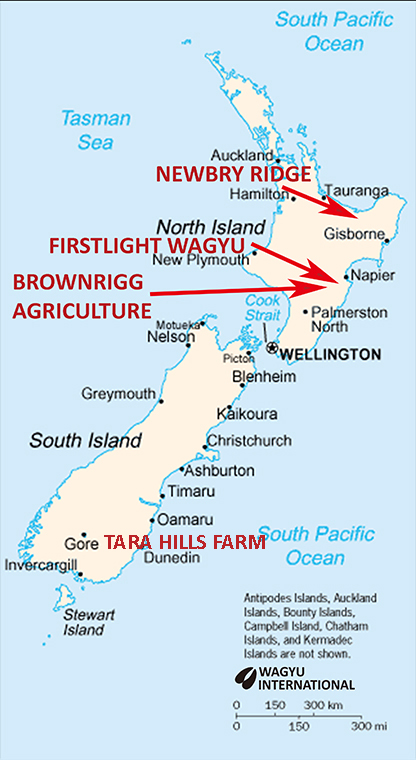 Wagyu/Akaushi exports/their calves or semen/embryos dispersed through Canada and Australia. DNA parent verifications and registrations were carried out through both the American Wagyu Association and the Australian Wagyu Association. This is large Fullblood herd has spread across the globe from the initial 200 Foundation animals and their calves. The Australians developed single step BLUP analysis using the MIJ camera for carcass algorithms, as they do in Japan, so breeding values are posted. Australian Wagyu is in demand back in the USA because of the stringent genomic testing that has been available and many Wagyu in USA, Canada, Europe and New Zealand (through New Zealand Wagyu Breeders Association) are registered in Australia so that they can be evaluated through BreedPlan BLUP analysis.
Wagyu/Akaushi exports/their calves or semen/embryos dispersed through Canada and Australia. DNA parent verifications and registrations were carried out through both the American Wagyu Association and the Australian Wagyu Association. This is large Fullblood herd has spread across the globe from the initial 200 Foundation animals and their calves. The Australians developed single step BLUP analysis using the MIJ camera for carcass algorithms, as they do in Japan, so breeding values are posted. Australian Wagyu is in demand back in the USA because of the stringent genomic testing that has been available and many Wagyu in USA, Canada, Europe and New Zealand (through New Zealand Wagyu Breeders Association) are registered in Australia so that they can be evaluated through BreedPlan BLUP analysis.
According to First Light Farms’ website, a Japanese family brought Wagyu genetics directly to New Zealand in 1994. This is the origin of “Wagyu Breeders” which is confined to New Zealand. Registration was administered by the New Zealand Wagyu Association that was formed on 9th August, 2012. DNA testing was carried out by Zoetis and its legacy company.
There was also a third export of Wagyu genetics from Japan. This went directly to Brazil in 1992. The Japanese company propagated the Wagyu herd for ten years then supplied the genetics through bulls and heifers through Brazil.
Producing Wagyu from grass
Traditionally Wagyu have been produced in Australia using the same principles as in Japan and 80% is exported globally. Insufficient energy is available from the best pastures in the world to obtain equivalent marbling like the best from 100% Wagyu in Japan off grain. First Light has been producing Wagyu off grass over 10 years and from the beginning, pure Wagyu cattle were found to be unsuitable for a 100% grass-fed system. A compromise was made with quality and higher growth was introduced by producing F1 (50% cross) from full blood Wagyu bulls across one of two cow herd systems — “traditional” (predominantly Angus) beef cows, and the second is known as “Kiwi” and this is from New Zealand dairy (Friesian/Jersey cross cows). The faster growth and dilution of Wagyu alleles from crossing reduce marbling potential but a joint venture between the Hawke's Bay company in partnership with the Ministry for Primary Industries (MPI) and Brownrigg Agricultural Group has been developed over 400 farms across the country.
The Marbled Grass-Fed Beef programme, 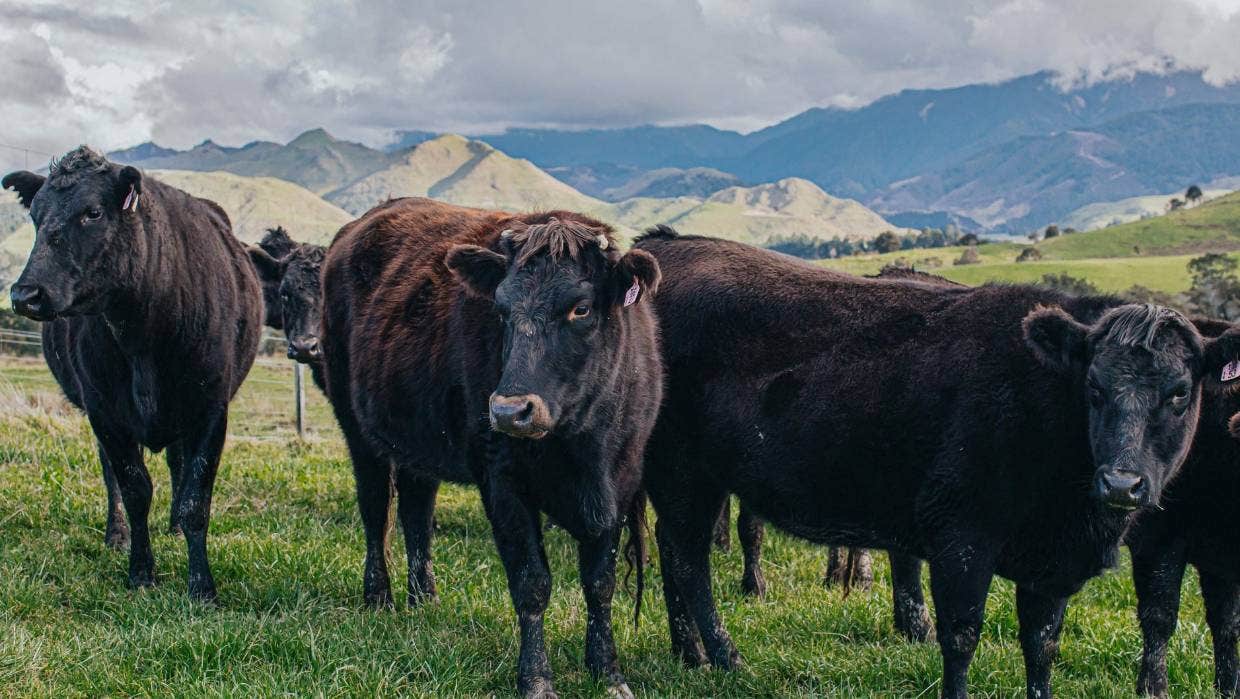 which started in 2012 and finished late last year, aimed to capitalise on growing global demand for high-quality grass-fed beef. The seven year partnership saw MPI sink $11 million into developing the premium product and marketing it overseas. Another $12m came from the other two partners.
which started in 2012 and finished late last year, aimed to capitalise on growing global demand for high-quality grass-fed beef. The seven year partnership saw MPI sink $11 million into developing the premium product and marketing it overseas. Another $12m came from the other two partners.
Semen from Wagyu bulls is inseminated into Dairy cows. Calves are raised on farm, or in specialist high care calf rearing facilities up to 90kg. When Wagyu dairy calves are weaned they either stay on farm or leave home for greener pastures. Dairy farmers have benefited from increased return from the reduction in the number of bobby calves, which are reared instead to produce Wagyu-cross beef.
First Light managing director Gerard Hickey said that: “Last year dairy breeders were getting around $200 per calf compared to $30 for a bobby calf.”
Grass-fed wagyu cattle thrive on a diet of rye and white clover, with specialist green feed crops occasionally used on those farms that experience particularly dry summers or cold winters. Grass-fed wagyu farms are located throughout both islands of New Zealand, across a range of climates and soil types. First Light farmers work closely as a team to supply finished cattle all year round; cattle are weighed regularly and assessed for weight and condition to ensure only the best animals are selected for processing each week.
"Around 22,000 calves were born last year and we're expecting to grow that number to 30,000 in the future."
It's available in 700 stores in New Zealand. The range available in New Zealand includes added value items like burgers and sausages, but demand for the steak was also growing, Hickey said. The beef is sold at Countdown and New World supermarkets.
First Light has offices in the US, United Kingdom, France and the United Arab Emirates. There are independent retailers in USA.
History of Wagyu in New Zealand
One of the largest suppliers of Wagyu-cross production is Brownrigg Agriculture which also happens to be one of the largest farming agribusinesses in New Zealand. Brothers David and Jonathan Brownrigg established the business in the highly productive region of Hawke's Bay. There were 12 farms with livestock (including prime lamb) and cropping enterprises over 10,000 hectares. A joint venture between the Ministry for Primary Industries (MPI), Brownrigg Agricultural Group and First Light Farms has culminated in the "Marbled Grass-Fed Beef programme" outlined above.
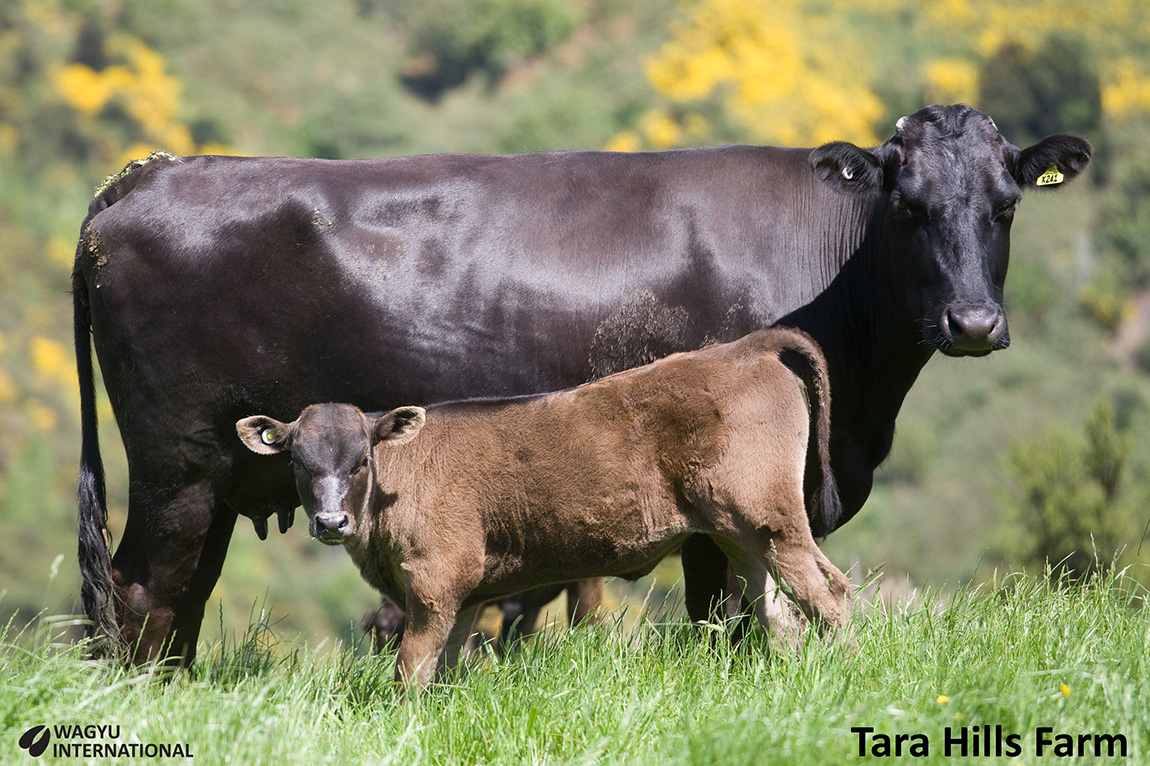
Tara Hills Farm is a small Wagyu farm on the outskirts of Dunedin. Since humble origins in 2014 from two cows and a steer, the herd has been built up to approximately 50. They are a mixture of Purebred and Fullblood Wagyu alongside a number of dairy cross nurse cows.
Tara Hills is run by a husband and wife team. Rachael grew up on a dairy farm and has always had animals as a part of her life. Shaddon was a city dweller but has embraced the rural life and would never consider going back to the city. They both love the fresh air and freedom we have, the challenge of working with animals, and the connection with the land and our food that it provides.
The first Wagyu were acquired in 2014 and were found to be intelligent, energetic and instinctive animals. They can be a challenge, but reward good stockmanship and farming like no other breed. A great deal of importance is placed on having happy, healthy and relaxed animals that are free to express their natural behaviours.
The cattle have access to grass year around and are supplemented by hay and baleage during the winter months. Regenerative farming is followed such as no till cultivation and intensively managed grazing. The pure Wagyu herd trace their origins to embryos that were imported from Australia in the early 1990s. New genetics was introduced in 2017 from embryos that were primarily based on Takeda genetics as well as Tajima sires Yasufuku Jr and Michifuku.
Maternal influences in the pure females by the foundation bull Hirashigetayasu J2351, through his son Ginjo Marblemax Hiranami B901. Hirashigetayasu is known for passing on growth, balance and maternal strength. Fullblood females are influenced by the foundation bull Itoshigefuji TF147. Itoshigefuji is arguably the best known bull for providing maternal qualities, with his offspring typically being gentle and well balanced with a good growth rate.
Tara Hill have a range of AI and live service bulls available which capture the major Japanese Black lines. Both ‘size' and 'marbling' bulls complement a given cow's breeding.
The breeding philosophy generally follows the Wagyu Fullblood Rotation program. In addition to the prefectural bloodines, they also look at Estimated Breeding Value (EBV) data where it is available, consider the recessive genetic conditions present in each animal, and plan rotations to minimise inbreeding coefficients. Finally each animal is considered on its merits; there can be considerable variation even between full siblings and the program is tailored to the cow as required. 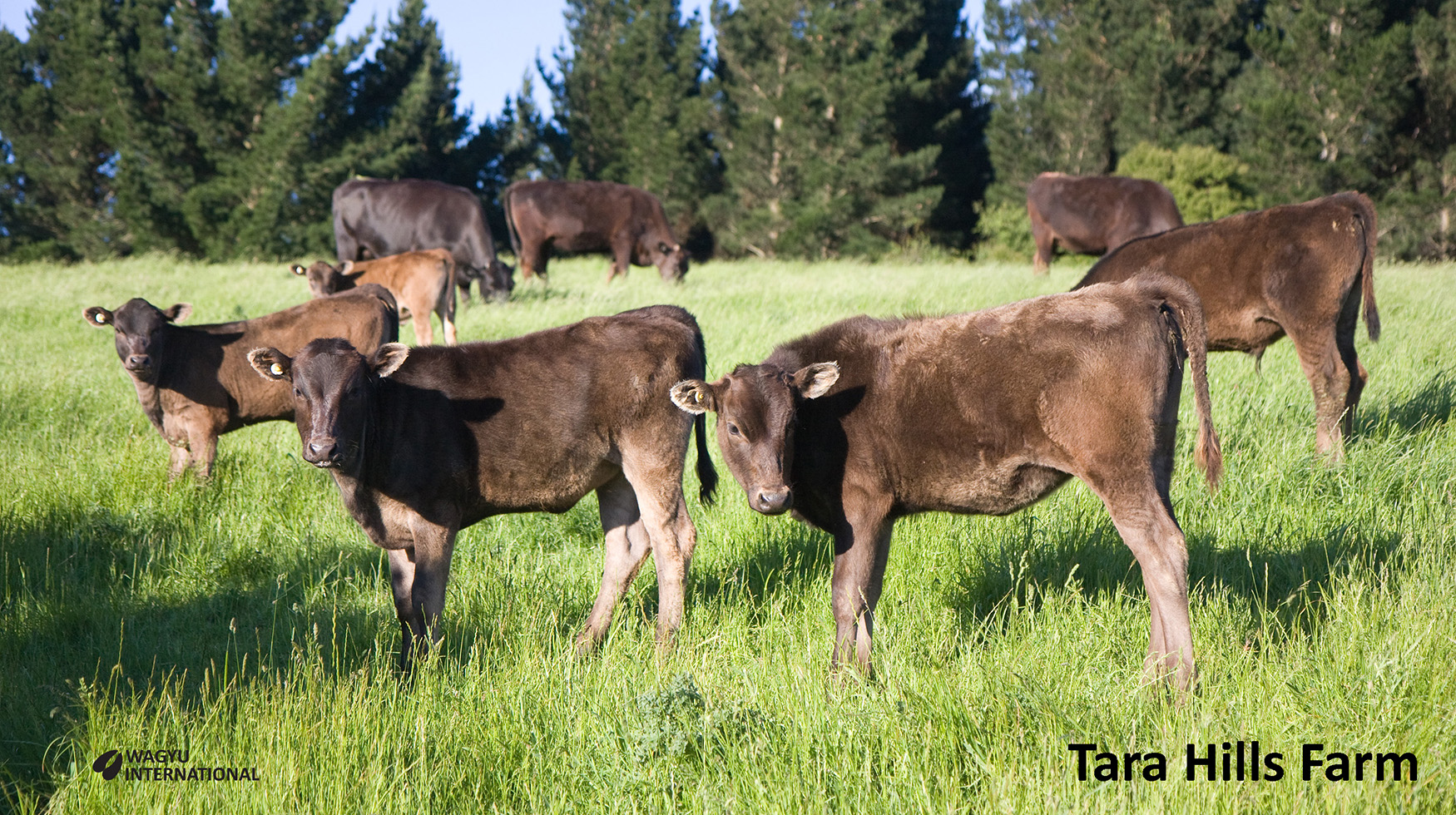
Special consideration is given to heifer bull selection - although Wagyu are known for easy calving there is a large variation in calf weights. Generally high Tajima content 'marbling' bulls are the best option, often producing calves in the 28-30kg range.
Best practice is applied when it comes to recording and testing of offspring. Weight measurements are regularly taken from birth and all calves are DNA parent verified through Zoetis NZ (purebreds) or the Australian Wagyu Association (fullbloods). The fullblood animals are all genomically tested and registered with the AWA and the purebred animals will be registered with the NZWBA.
The original Wagyu association was started in 11th May 1992 and called the New Zealand Wagyu Breeders Association. Malcom Collier is President and he oversees the general operations and functionality of NZWBA. There is also a vice president, treasurer, secretary, and web designer.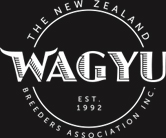
Membership of the association provides access to a communications forum with Wagyu breeders to share and exchange ideas in the industry. Members will also have the opportunity to build a community of reliable, relational and ethical network of breeders who have a variety of farming skills, business experience in marketing; sales, and techniques in animal care.
Additionally, as a NZWBA member, there is access to industry information, helpful resources in promoting pure breed cattle, and to the HerdBook for registration of cattle. By becoming a part of the small, but growing community of breeders; there is the opportunity to learn about sustainable grazing, and farming along with discounts on Wagyu conferences.
The New Zealand Wagyu Association was formed on 9th August, 2012.
Wagyu Genetics
Brownrigg Agriculture has an exclusive arrangement to supply Wagyu semen to the "Marbled Grass-Fed Beef programme".
Other producers are finishing with grass, or grain or both and are members of New Zealand Wagyu Breeders Association and buy Wagyu Fullblood and/or Purebred for polling globally.
Wagyu International has been collaborating with producers off pasture in the southern and northern hemisphere and seen results from traditional Wagyu genetics while evaluating nutritional influences.
The following semen is recommended for use in Fullblood Wagyu breeding or Wagyu cross and Fullblood beef production in New Zealand:
| NAME OF ANIMAL | COLOUR | TYPE | CONTACT |
| Lisheen N23 | Black | Semen | Lisheen Wagyu |
| Lisheen P26 | Black | Semen | Lisheen Wagyu |
| Lisheen Q39 | Black | Semen | Lisheen Wagyu |
| Trent Bridge F115 | Black | Semen | Wagyu International |
Click on the animal name above to see more information.
References
Brownrigg Agriculture website.
Flaws, Bonnie, 2020. New Zealand grass-fed wagyu prized by US consumers. Stuff.co.nz 26th January 2020.
New Zealand Wagyu Association.
New Zealand Wagyu Breeders Association
Tara Hill website.
DISCLAIMER Wagyu International provides information that has been supplied by other parties and gives no warranty (express or implied) as to the data completeness, accuracy or fitness for a particular purpose.
